NCERT Solutions for Class 12 Accountancy Chapter 4 Reconstitution of a Partnership Firm – Retirement/Death of a Partner
NCERT Solutions CBSE Sample Papers Accountancy Class 12 Accountancy
DO IT YOURSELF
Question 1. Anita, Jaya and Nisha are partners sharing profits and losses in the ratio of 1:1:1 Jaya retires from the firm. Anita and Nisha decided to share the profit in future in the ratio 4 :3. Calculate the gaining ratio.

Question 2. Azad, Vijay and Amit are partners sharing profits and losses in the proportion of 1/4,1/8,10/16 and Calculate the new profit sharing ratio between continuing partners if (a) Azad retires; (b) Vijay retires; (c) Amit retires.
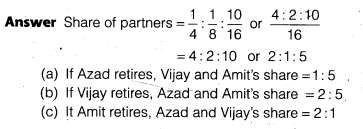
Question 3. Calculate the gaining ratio in each of the above situations.
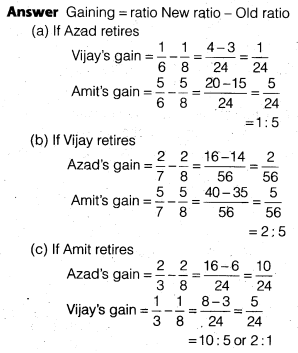
Question 4.Anu, Prabha and Milli are partners. Anu retires. Calculate the future profit sharing ratio of continuing partners and gaining ratio if they agree to acquire her share : (a) in the ratio of 5:3; (b) equally.
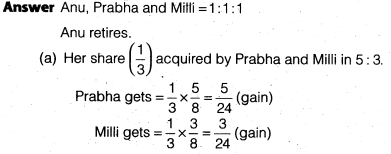
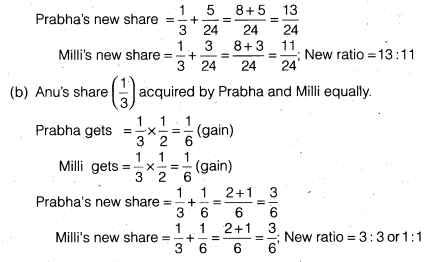
Question 5. Rahul, Robin and Rajesh are partners sharing profits in the ratio of 3 : 2 : 1. Calculate the new profit sharing ratio of the remaining partners if (i) Rahul retires; (ii) Robin retires; (iii) Rajesh retires.
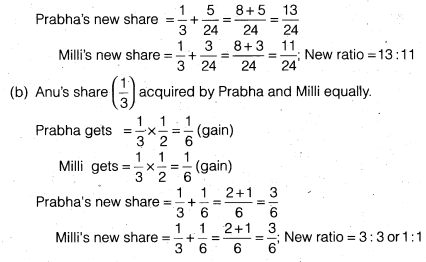
Question 6.Puja, Priya, Pratistha are partners sharing profits and losses in the ratio of 5 : 3 : 2. Priya retires. Her share is taken by Priya and Pratistha in the ratio of 2 : 1. Calculate the new profit sharing ratio.
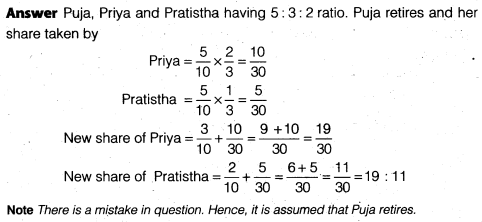
Question 7.Ashok, Anil and Ajay are partners sharing profits and losses in the ratio of 1/2, 3/10 and 1/5. . Anil retires from the firm. Ashok and Ajay decide to share future profits and losses in the ratio of 3 : 2. Calculate the gaining ratio.
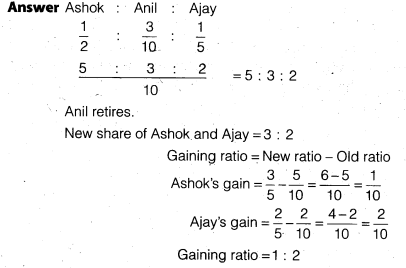
TEST YOUR UNDERSTANDING I
Choose the correct option in the following questions:
Question1. Abhishek, Rajat and Vivek are partners sharing profits in the ratio of 5:3:2. If Vivek retires, the New Profit Sharing Ratio between Abhishek and Rajat will be–
(a) 3:2 (b) 5:3 (c) 5:2 (d) None of these
Answer
(b) 5 :3
Question 2. The old profit sharing ratio among Rajender, Satish and Tejpal were 2:2:1. The new profit sharing ratio after Satish’s retirement is 3:2. The gaining ratio is
(a) 3 : 2 (b) 2 : 1
(c) 1 : 1 (d) 2 : 2
Answer (c)

Question 3. Anand, Bahadur and Chander are partners. Sharing Profit equally on Chander’s retirement, his share is acquired by Anand and Bahadur in the ratio of 3 : 2. The new profit sharing ratio between Anand and Bahadur will be
(a) 8 : 7 (b) 4 : 5 (c) 3 : 2 (d) 2:3
Answer
(a)
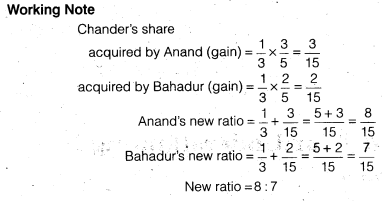
Question 4. In the absence of any information regarding the acquisition of share in profit of the retiring/deceased partner by the remaining partners, it is assumed that they acquire his/her share
(a) old profit sharing ratio (b) new profit sharing ratio (c) equal ratio (d) None of these
Answer
(a) Old profit sharing ratio
TEST YOUR UNDERSTANDING II
• Choose the correct option in the following questions
Question 1. On retirement/death of a partner, the retiring/deceased partner’s capital account will be credited with
(a) his/her share of goodwill
(b) goodwill of the firm
(c) shares of goodwill of remaining partners
(d) None of the above
Answer
(a) His/Her share of goodwill
Question 2. Gobind, Hari and Pratap are partners. On retirement of Gobind, the goodwill already appears in the Balance Sheet at T 24,000. The goodwill will be written off
(a) by debiting all partners’ capital accounts in their old profit sharing ratio
(b) by debiting remaining partners’ capital accounts in their new profit sharing ratio
(c) by debiting retiring partners’ capital accounts from his share of goodwill
(d) None of the above
Answer
(a) By debiting all partners’ capital accounts in their old profit sharing ratio
Question 3.Chaman, Raman and Suman are partners sharing profits in the ratio of 5:3:2. Raman retires, the new profit sharing ratio between Chaman and Suman will be 1:1. The goodwill of the firm is valued at Rs. 1,00,000 Raman’s share of goodwill will be adjusted
(a) by debiting Chaman’s Capital account and Suman’s Capital Account with Rs 15,000 each.
(b) by debiting Chaman’s Capital account and Suman’s Capital Account with Rs. 21,429 and 8,571 respectively.
(c) by debiting only Suman’s Capital Account with Rs. 30,000.
(d) by debiting Raman’s Capital account with Rs. 30,000.
Answer
(c)

Question 4. On retirement/death of a partner, the remaining partner(s) who have gained
due to change in profit sharing ratio should compensate the
(a) retiring partners only.
(b) remaining partners (who have sacrificed) as well as retiring partners.
(c) remaining partners only (who have sacrificed).
(d) none of these.
Answer (b) Remaining partners (who have sacrificed) as well as partners
DO IT YOURSELF II
Question 1. Vijay, Ajay and Mohan are friends. They passed B (Hons) from Delhi University in June, 2013. They decided to business of computer hardware.
On 1st of August, 2013, they introduced the capital of Rs. 50,000, Rs.30,000 and Rs. 20,000 respectively and started the business in partnership at Delhi. The profit sharing ratio decided between there was 4:2:1. The business was running successfully. But on 1st February, 2019, due to certain unavoidable circumstances and family circumstances, Ajay decided to settle in Pune and decided to retire from the partnership on 31st March, 2020; with the consent of partners, Ajay retires as on 31st March, 2020, the position of assets and liabilities are as follows
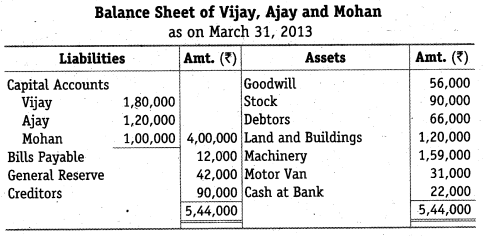
On the date of retirement, the following adjustments were to be made
(1) Firm’s goodwill was valued at Rs. 1,48,000.
(2) Assets and Liabilities are to be valued as under; Stock Rs. 72,000; Land and Buildings Rs. 1,35,600; Debtors Rs. 63,000; Machinery Rs.1,50,000; Creditors Rs. 84,000.
(3) Vijay to bring Rs. 1,20,000 and Mohan Rs. 30,000 as additional capital.
(4) Ajay was to be paid Rs. 97,200 in cash and the balance of his Capital Account to be transferred to his Loan Account Work out the amount
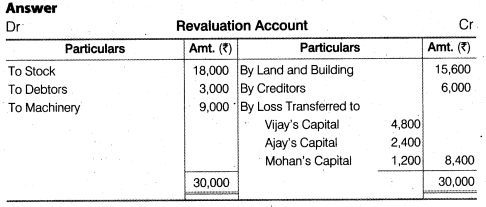
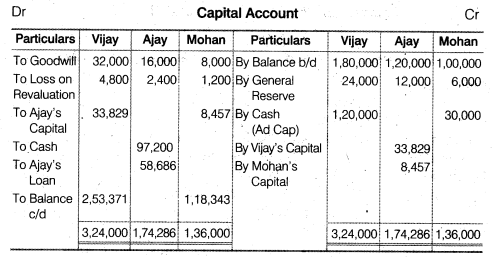
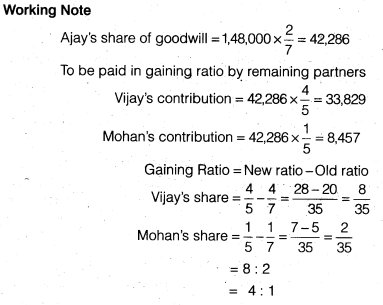
Do it yourself III
Question 1. The Balance Sheet of A, B and C who were sharing the profits in proportion to their capitals stood as on March 31, 2007.
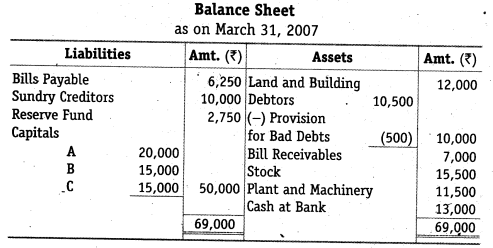
B retired on the date of Balance Sheet and the following adjustments were to be made
(a) Stock was depreciated by 10%.
(b) Factory building was appreciated by 12%.
(c) Provision for doubtful debts to be created up to 5%.
(d) Provision for legal charges to be made at Rs. 265.
(e) The goodwill of the firm to be fixed at Rs. 10,000.
(f) The capital of the new firm to be fixed at Rs. 30,000. The continuing partners decide to keep their capitals in the new profit sharing ratio of 3:2.
Work out the final balances in capital accounts of the firm and the amount to bh brought in and/or withdrawn by A and C to make their capitals proportionate to then new profit sharing ratio.
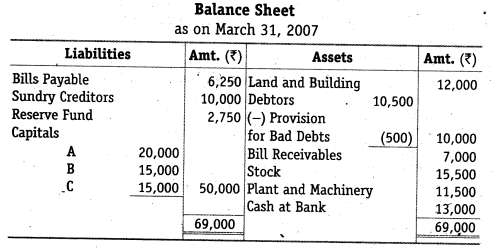
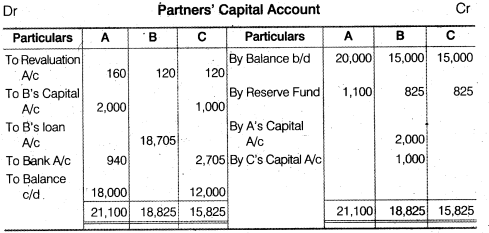
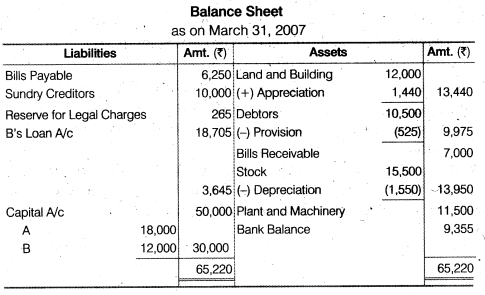
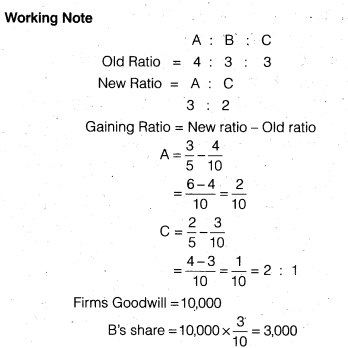

Question 2. R, S and M were carrying on business in partnership
sharing profits in the ratio of 3 : 2 : 1 respectively. On March 31,
2011, Balance Sheet of the firm stood as follows
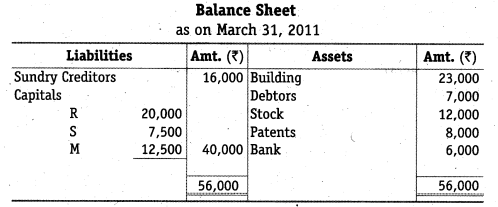
Shyam retired on the above mentioned date on the following terms
(a) Buildings to be appreciated by ? 8,800.
(b) Provision for doubtful debts to be made @ 5% on debtors.
(c) Goodwill of the firm to be valued at ? 9,000.
(d) Rs.5,000 to be paid to S immediately and the balance due to him to be treated as a loan carrying interest @ 6% per annum.
Prepare the balance sheet of the reconstituted firm.
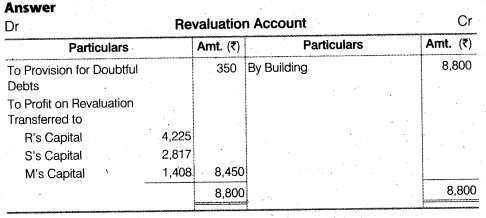
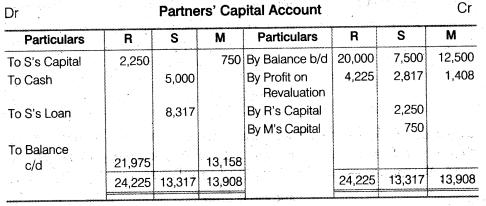
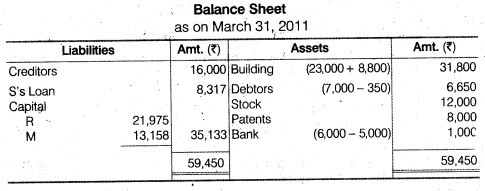
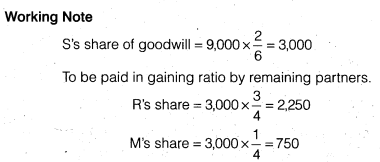
Do it Yourself IV
Question 1. On December 31, 2007, the Balance Sheet of Pinki, Qureshi and Rakesh showed as under
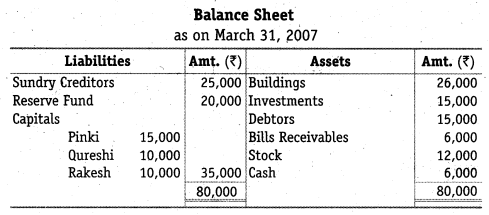
The partnership deed provides that the profit be shared in the ratio of 2:1:1 and that in the event of death of a partner, his executors be entitled to be paid out
(a) The capital of his credit at the date of last Balance Sheet.
(b) His proportion of reserves at the date of last Balance Sheet.
(c) His proportion of profits to the date of death based on the average profits of the last three completed years, plus 10%.
(d) By way of goodwill, his proportion of the total profits for the three preceding years. The net profit for the last three years were
Rs.
2005 16,000
2006 16,000
2007 15,400
Rakesh died on April 1, 2007. He had withdrawn Rs. 5,000 to the date of his death. The investment were sold at par and R’s Executors were paid off. Prepare Rakesh’s Capital Account that of his executors.
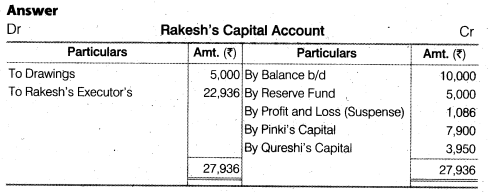

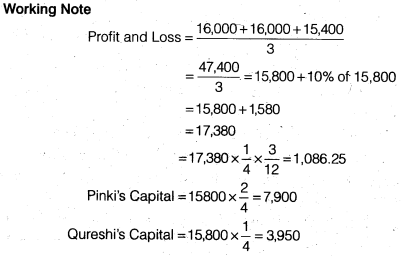
Short Answer Type Questions
Question 1. What are the different ways in which a partner can retire from the firm?
Answer
A partner can retire from the firm in three different ways. They are as follow
(i) Retirement Through Mutual Consent A partnership firm take its shape through mutual consent of partners in the same way. A partner may retire if all the partners agree on the decision of his/her retirement.
(ii) When There is a Provision in Partnership Deed When there is a provision for the retirement of a partner in the partnership deed in that case partner may retire from the firm by expressing his/her intention of leaving the firm though a notice to the other partners of the firm.
(iii) Retirement Through Written Notice In case when partnership among the partners is at will, then a partner may retire by giving notice in writing to all the other partners informing them about his/her intention to retire.
Question 2. Write the various matters that need adjustments at the time of retirement of partners.
Answer
The following are the various matters that need to be adjusted at the time of retirement of partners/partner
(i) Revaluation of assets and liabilities of the new firm.
(ii) Calculation of goodwill of the new firm and its accounting treatment.
(iii) Calculation of new ratio of the remaining partners of the firm.
(iv) Computation of new gaining ratio among rest of the partners.
(v) Distribution of accumulated profits and losses and reserves among all the partners (including the retiring partner).
(vi) Treatment of Joint Life Policy.
(vii) Disposal of the amount due to the retiring partner
(viii) Adjustment of capital accounts of the remaining partners in their new profit sharing ratio.
Question 3. Distinguish between sacrificing ratio and gaining ratio.
Answer
Difference between Sacrificing and Gaining Ratio
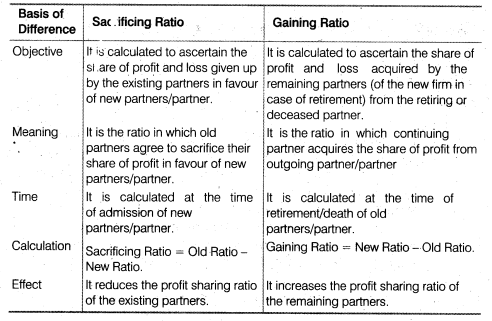
Question 4. Why do firm revaluate assets and reassess their liabilities on retirement or on the event of death of a partner?
Answer
At the time of retirement or death of a partner, it becomes inevitable to revalue the assets and liabilities of the firm for ascertaining their true and fair values. The revaluation is necessary as the value of assets and liabilities may increase or decrease with the passage of time.
Further, it may be possible that there are certain assets and liabilities that remained unrecorded in the books of accounts. The retiring or the deceased partner may be benefitted or may bear loss due to change in the values of assets and liabilities. Therefore, the revaluation of the assets and liabilities is necessary in order to ascertain the true profit or loss that is to be divided among all the partners in their old profit sharing ratio.
Question 5. Why a retiring/deceased partner is entitled to a share of goodwill of the firm?
Answer
Goodwill is an intangible asset of a firm that is earned by the efforts of all the partners of the firm. After the retirement or death of a partner, the fruits of the past performance and reputation will be shared only by the remaining partners. Thus, the remaining partners should compensate the retiring orthe deceased partner by entitling him/her a share of firm’s goodwill.
Long Answer Type Questions
Question 1. Explain the modes of payment to a retiring partner.
Answer
Payment to a retiring partner can be made in the following ways
(i) Lump Sum Payment
: A lump sum payment can be made to the retiring partner in full settlement. In that case, the following Journal entry will be passed

(ii) Opening the Loan Account
Sometimes the amount due to the retiring partner is paid in instalments then the balancing figure of his/her capital account is transferred to his/her loan account, in this case, the retiring partner receives equal instalments along with the interest on the amount outstanding. In that case the following journal entries will be passed for transferring the amount paid to him/her in retiring partner’s loan account.

(iii)Some Payment in Cash and Some in Instalment
Sometimes the amount due to the retiring partner is paid partly in cash and partly in equal instalments in that case a certain amount is paid in cash to the retiring partner and the rest amount due to him/her is transferred to his/her loan account. The following necessary journal entry is to be passed.
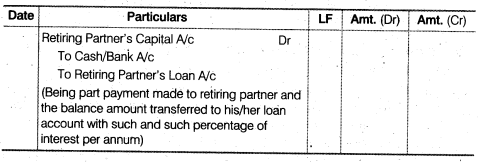
Question 2. How will you compute the amount payable to a deceased partner?
Answer
In case of a death, the legal executor of the deceased partner is entitled for a claim which includes his share of profit or loss, interest on capital, interest on drawings In that case for computing the amount payable is calculated by preparing the deceased partner’s capital account as follows
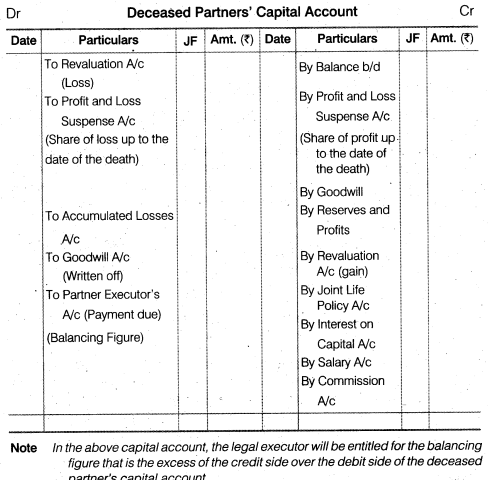
Note:
In the above capital account, the legal executor will be entitled for the balancing
figure that is the excess of the credit side over the debit side of the deceased partner’s capital account.
Question 3. Explain the treatment of goodwill at the time of retirement or on the event of death of a partner.
Answer
At the time of retirement or is the event of death of a partner, the goodwill of the firm is adjusted among the partners in their gaining ratio with the share of goodwill of the retiring or the deceased partner. At the time of retirement or on the event of death of a partner, goodwill account is not opened hence only two situations are left for treating the goodwill first when
goodwill account is already there in the book or it appear in the books and second when the amount of goodwill is not appearing in the books.
The treatment of goodwill will be as follows in the above two situations
First Situation When Goodwill Already Appears in the Books of the Firm
Step 1
Write-off the Existing Goodwill When goodwill account already exist in the book of the firm or mentioned in the book first of all, it will be written oft and should be distributed among all the partners of the firm including the retiring or the deceased partner in their old profit sharing ratio. In that case, the journal entry will be as follows

Step 2
Adjusting Goodwill Through Partners’ Capital Account
After writing off the old goodwill, the amount of goodwill now needs to be adjusted through the partner’s capital account with the share of the goodwill of the retiring orthe deceased partner. The following journal entry is passed.

Second Situation When No Goodwill Appears in the Books of the Firm
In second case, when no goodwill appears in the books of the firm, the amount of goodwill will be adjusted through the partner’s capital account with the share of the goodwill of the retiring or the deceased partner. The following journal entry’is passed

Question 4. Discuss the various methods of computing the share in profits in the event of death of a partner.
Answer
Computation of profit will be different in case of death of a partner as compare to the retirement. The reason is that in case of retirement everything is pre-planned but in case of death nothing is planned. In case of death, the share of profit.can be calculated by one of the two methods.
(i) On the Basis of Time
In this method, profit upto the date of the death of the partner is calculated on the basis of time passed till the death of the partner from the beginning of the year on the bases of the last year’s/years’ profit or average profit of last few years.
The assumption in this method is that the profit will be uniform throughout the current year. The share of the deceased partner profit will be calculated as follows

Example A, B, C and D are equal partners. The profit of the firm for the years 2009, 2010 and 2011 are ? 5,00,000, ? 7,00.000 and <9,00,000 respectively. C dies on June 30, 2012. The share of C in the firm’s profit will be calculated on the basis of average profit of last three years. Firm closes its books every year on December 31.
In this case, C’s share in the profits will be calculated for four months. i e., from January 1. 2012

(ii) On the Basis of Sale
In this method, profit up to the date of the death of the partner is calculated on the basis of sales affected till the date of the’ death of the partner from the beginning of the year. The assumption in this method is that the net profit margin for current year will be same as the previous year. The share of the deceased partner profit will be calculated as follows

Example A, B and C are equal partners. The last year’s sales and profit were ? 40,00,000 and ? 4,00,000. C died on June, 2012. Sales of the current year till the date of C’s death amounts to ? 15,00,000. Firm closes its books on December 31 every year.

Numerical Questions
Question 1. Aparna, Manisha and Sonia are partners sharing profits in the ratio of 3 : 2 :1. Manisha retires and goodwill of the firm is valued at Rs. 1,80,000. Aparna and Sonia decided to share future profits in the ratio of 3 : 2. Pass necessary journal entries.

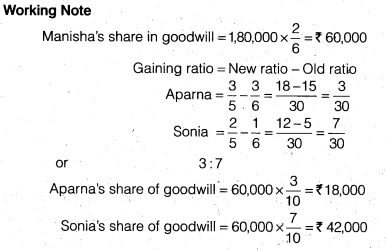
Question 2. Sangeeta, Saroj and Shanti are partners sharing profits in the ratio of 2 : 3 : 5. Goodwill is appearing in the books at a value of Rs. 60,000. Sangeeta retires and goodwill is valued at Rs. 90,000. Saroj and Shanti decided to share future profits equally. Record necessary journal entries.
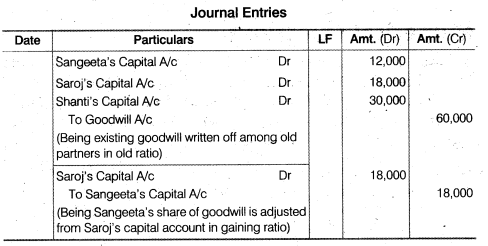
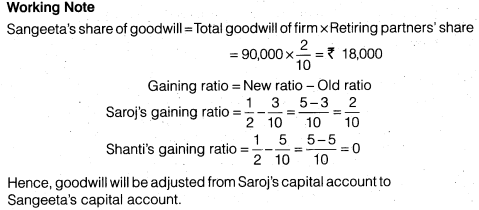
Question 3. Himanshu, Gagan and Naman are partners sharing profits and losses in the ratio of 3 : 2 :1 On March 31, 2007, Naman retires. The various assets and liabilities of the firm on the date were as follows Cash Rs.10,000, Building Rs. 1,00,000, Plant and Machinery Rs. 40,000, Stock Rs. 20,000, Debtors Rs. 20,000 and Investments Rs. 30,000.
The following was agreed upon between the partners on Naman’s retirement
(i) Building to be appreciated by 20%.
(ii) Plant and Machinery to be depreciated by 10%.
(iii) A provision of 5% on debtors to be created for bad and doubtful debts.
(iv) Stock was to be valued at Rs. 18,000 and Investment at Rs. 35,000.
Record the necessary journal entries to the above effect and prepare the revaluation account.
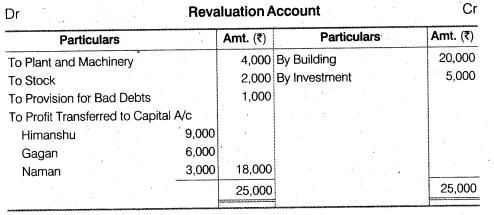
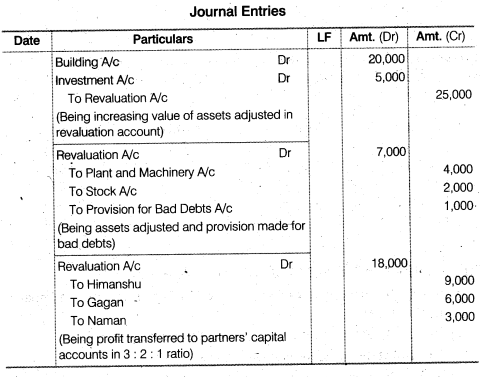
Question 4. Naresh, Raj Kumar and Bishwajeet are equal partners. Raj Kumar decides to retire. On the date of his retirement, the Balance Sheet of the firm showed the following : General Reserves Rs.36,000 and Profit and Loss Account (Dr) Rs. 15,000.
Pass the necessary journal entries to the above effect.
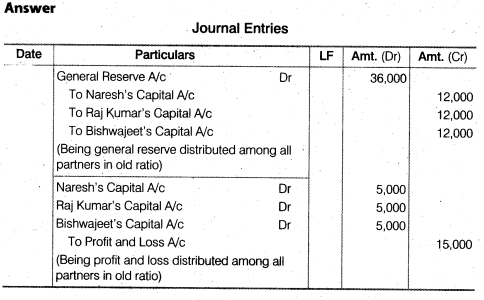
Question 5. Digvijay, Brijesh and Parakaram were partners in a firm sharing profits in the ratio of 2 : 2 : L Their Balance Sheet as on March 31, 2007 was as follows
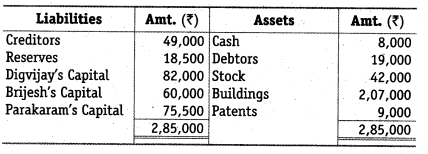
Brijesh retired on March 31, 2007 on the following terms
(i) Goodwill of the firm was valued at ? 70,000 and was not to appear in the books.
(ii) Bad debts amounting to ? 2,000 were to be written off.
(iii) Patents were considered as valueless.
Prepare revaluation account, partners’ capital accounts and the balance sheet of Digvijay and Parakaram after Brijesh’s retirement
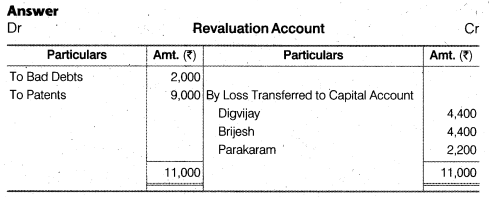
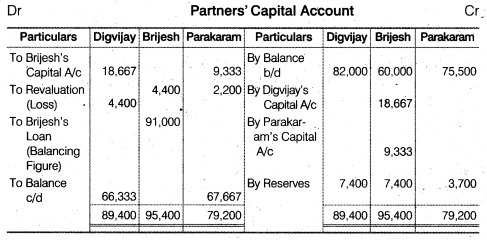
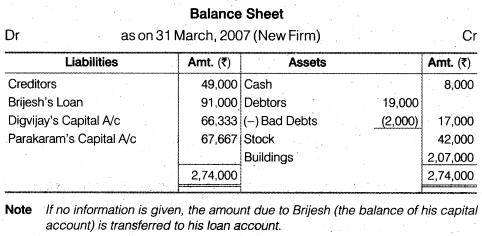
Note:
If no information is given, the amount due to Brijesh (the balance of his capital account) is transferred to his loan account.
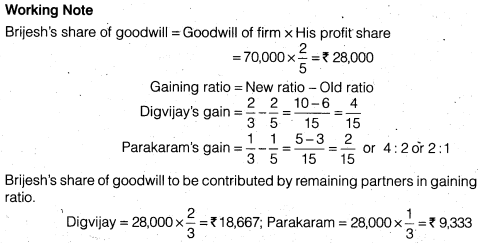
6. Radha, Sheela and Meena were in partnership sharing profits and losses in
the proportion of 3:2:1. On April 1, 2007, Sheela retires from the firm. On that
date, their Balance Sheet was as follows:
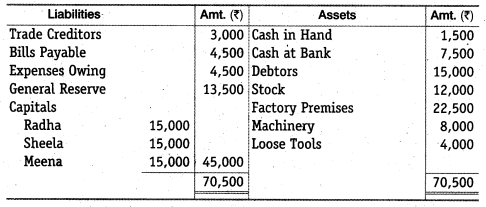
The terms were
(a) Goodwill of the Firm was valued at ? 13,000.
(b) Expenses owing to be brought down to ? 3,750.
(c) Machinery and Loose Tools are to be valued at 10% less than their book value.
(d) Factory premises are to be revalued at ? 24,300.
Prepare
1. Revaluation account
2. Partners’capital accounts
3. Balance sheet of the firm after retirement of Sheela
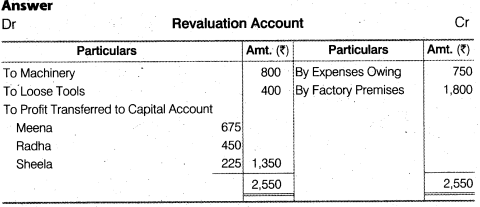
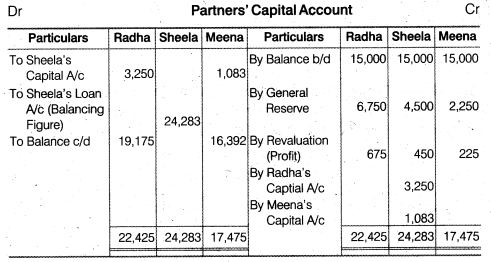
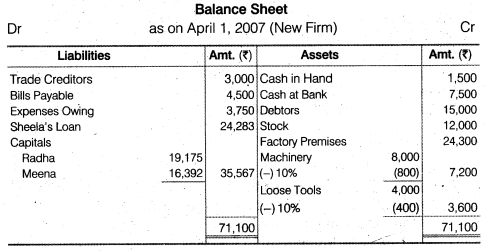
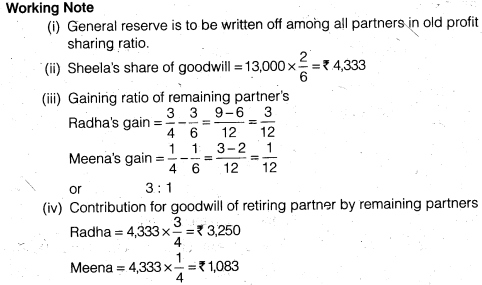
7. Pankaj, Naresh and Saurabh are partners sharing profits in the ratio of 3 : 2 :
1. Naresh retired from the firm due to his illness. On that date the Balance
Sheet of the firm was as follows:
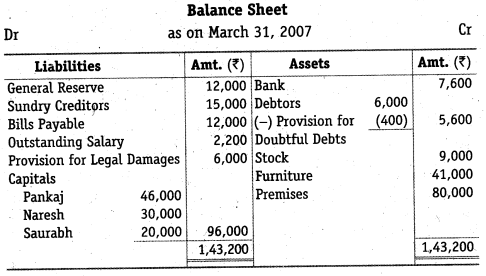
Additional Information
(i) Premises have appreciated by 20%, stock depreciated by 10% and provision for doubtful debts was to be made 5% on debtors. Further, provision for legal damages is to be made for Rs. 1,200 and furniture to be brought up to Rs. 45,000.
(ii) Goodwill of the firm be valued at Rs. 42,000.
(iii) Rs. 26,000 from Naresh’s Capital account be transferred to his loan account and balance be paid through bank; if required, necessary loan may be obtained from Bank.
(iv) New profit sharing ratio of Pankaj and Saurabh is decided to be 5 :1.
Give the necessary ledger accounts the balance sheet of the firm after Naresh’s retirement.
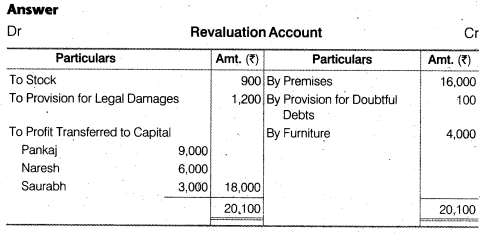
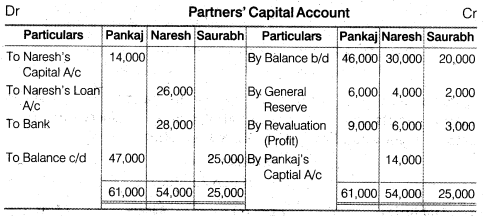

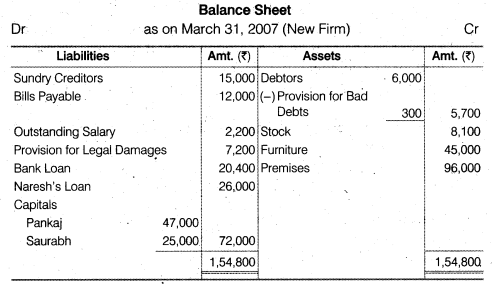
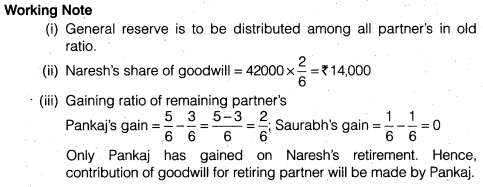
8. Puneet, Pankaj and Pammy are partners in a business sharing profits and
losses in the ratio of 2 : 2 : 1 respectively. Their balance sheet as on March 31,
2007 was as follows:
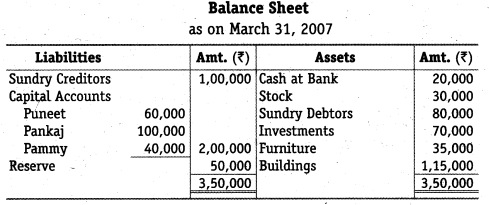
Mr. Pammy died on September 30, 2007. The partnership deed provided the
following:
(i) The deceased partner will be entitled to his share of profit up to the date of
death calculated on the basis of previous year’s profit.
(ii) He will be entitled to his share of goodwill of the firm calculated on the
basis of 3 years’ purchase of average of last 4 years’ profit. The profits for
the last four financial years are given below:
for 2003–04; Rs. 80,000; for 2004–05, Rs. 50,000; for 2005–06, Rs. 40,000;
for 2006–07, Rs. 30,000.
The drawings of the deceased partner up to the date of death amounted to
Rs. 10,000. Interest on capital is to be allowed at 12% per annum.
Surviving partners agreed that Rs. 15,400 should be paid to the executors
immediately and the balance in four equal yearly instalments with interest
at 12% p.a. on outstanding balance.
Show Mr. Pammy’s Capital account, his Executor’s account till the settlement
of the amount due
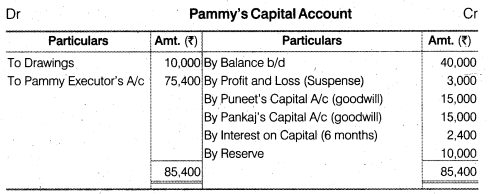
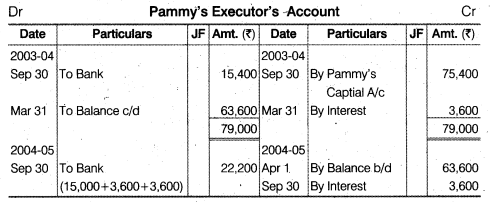
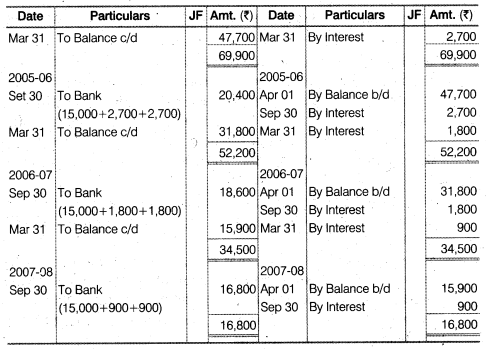
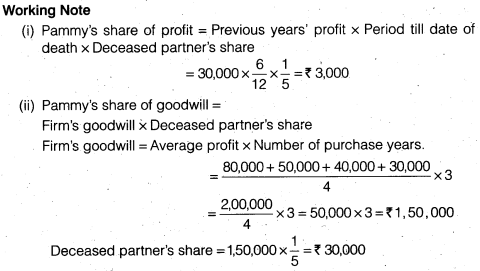

(v) Calculation of Instalments Amount Due to Pammy’s Executor after paying some amount in cash was Rs.60,000 (= 75,400 -15,400) divided in 4 equal instalments (i.e., 60,000/4 = Rs. 15,000 each).
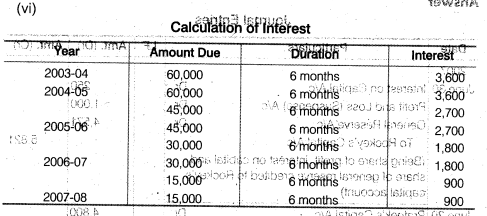
Question 9. Following is the Balance Sheet of Prateek, Rockey and Kushal as on March 31, 2007.
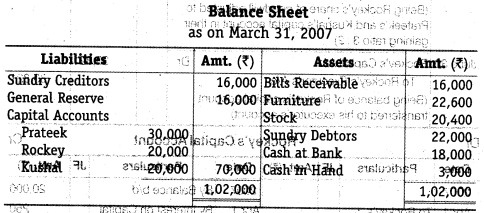
Rockey died on June 30, 2007. Under the terms of the partnership deed, the executors of a deceased partner were entitled to
(a) Amount standing to the credit of the Partner’s capital account.
(b) Interest on capital at 5% per annum.
(c) Share of goodwill on the basis of twice the average of the past three years’ profit.
(d) Share of profit from the closing date of the last financial year to
the date of death on the basis of last year’s profit.
Profits for the year ending on March 31, 2005, March 31, 2006 and March 31, 2007 were Rs. 12,000, Rs. 16,000 and Rs.14,000 respectively. Profits were shared in the ratio of capitals.
Pass the necessary journal entries and draw up Rockey’s capital account to be rendered to his executor.
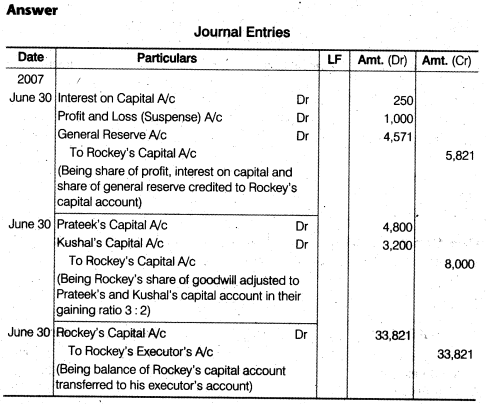
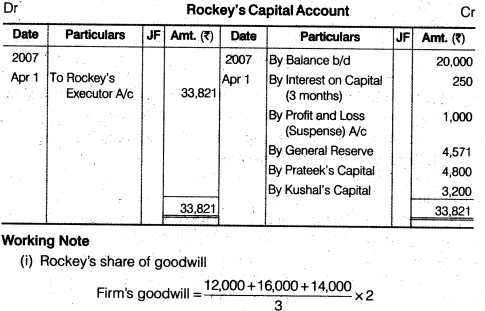
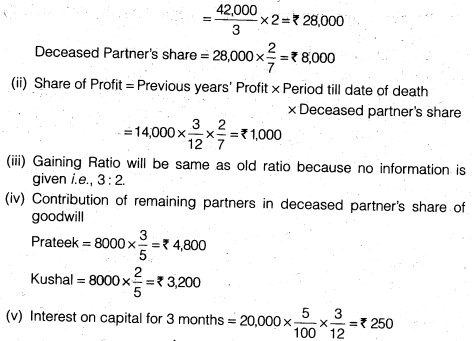
10. Narang, Suri and Bajaj are partners in a firm sharing profits and losses in
proportion of 1 2 , 1 6 and 1 3 respectively. The Balance Sheet on April 1, 2007
was as follows:
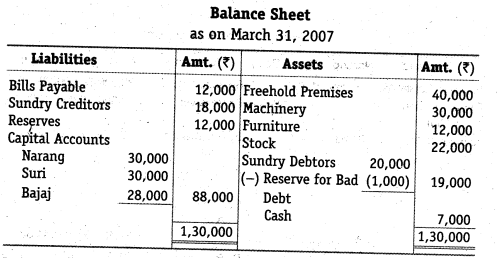
Bajaj retires from the business and the partners agree to the following
(a) Freehold premises and stock are to be appreciated by 20% and 15% respectively.
(b) Machinery and furniture are to be depreciated by 10% and 7% respectively.
(c) Bad Debts reserve is to be increased to Rs. 1,500.
(d) Goodwill is valued at Rs. 21,000 on Bajaj’s retirement.
(e) The continuing partners have decided to adjust their capitals in their new profit sharing ratio after retirement of Bajaj. Surplus/deficit, if any, in their capital accounts will be adjusted through current accounts.
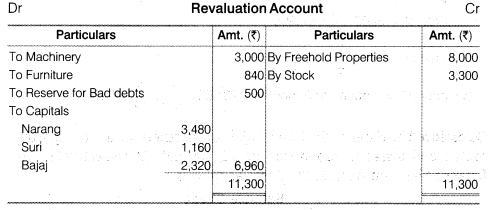
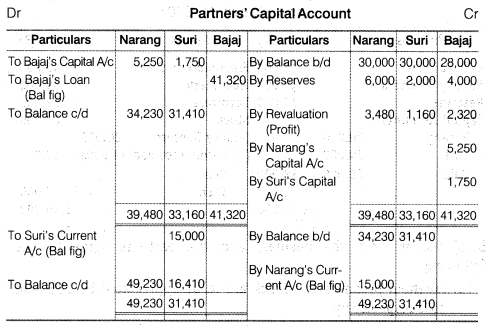
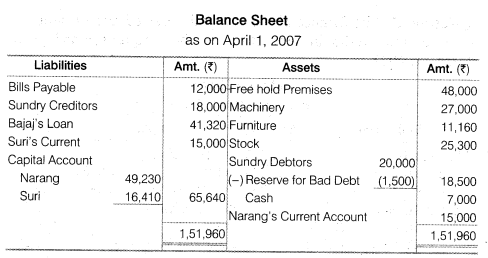
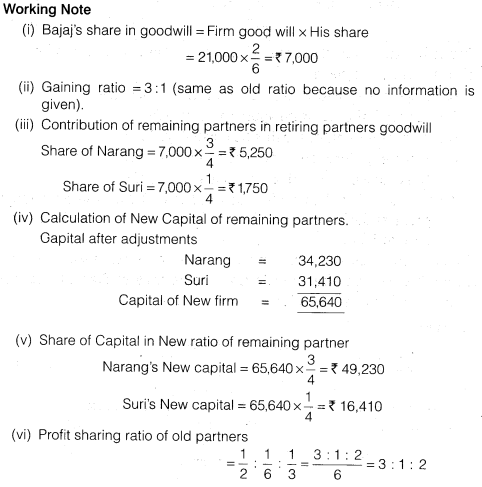
11. The Balance Sheet of Rajesh, Pramod and Nishant who were sharing profits in
proportion to their capitals stood as on March 31, 2007:
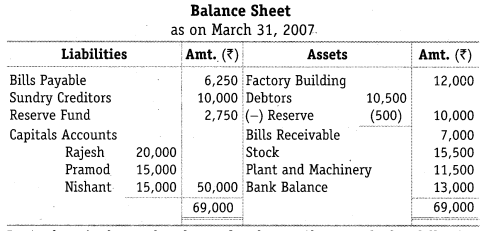
Pramod retired on the date of Balance Sheet and the following adjustments were made
(a) Stock was valued at 10% less than the book value.
(b) Factory buildings were appreciated by 12%.
(c) Reserve for doubtful debts be created up to 5%.
(d) Reserve for legal charges to be made at Rs. 265.
(e) The goodwill of the firm be fixed at Rs. 10,000.
(f) The capital of the new firm be fixed at Rs. 30,000. The continuing partners decide to keep their capitals in the new profit sharing ratio of 3 : 2.
Pass journal entries and prepare the balance sheet of the reconstituted firm after transferring the balance in Pramod’s capital account to his loan account.
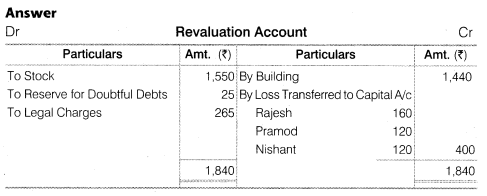
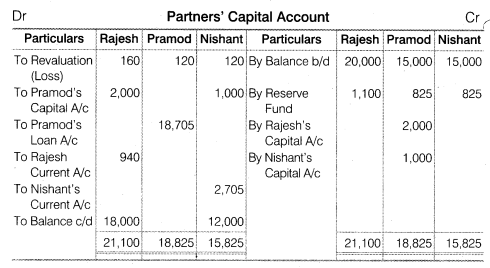
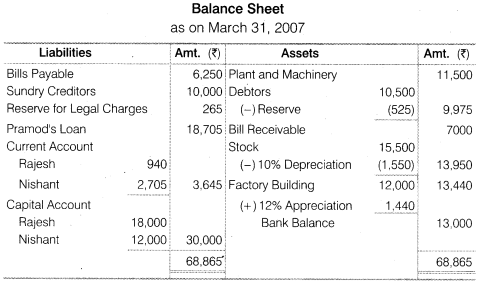
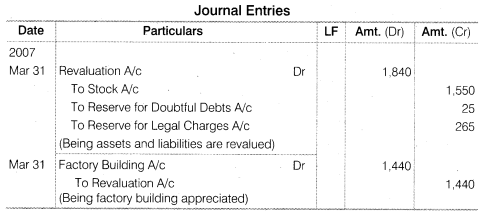
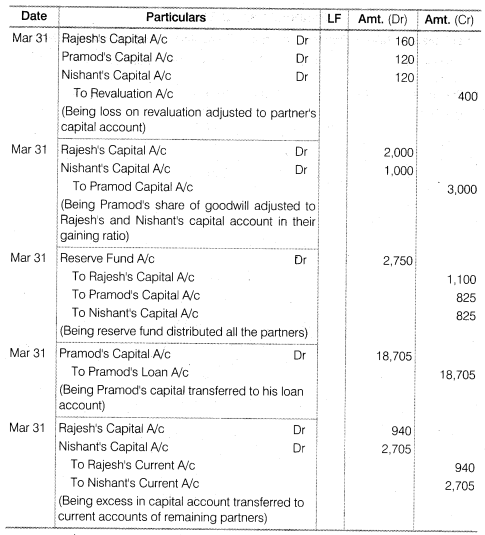
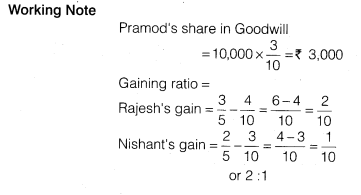

Note
(i) According to point (f) of the question the capital of remaining partner’s should beRs. 18.000and Rs. 12,000 respectively as the firms capital is fixed at?
Rs.30,000 and their share of profit is 3 : 2.
(ii) To match the answer of total of Balance sheet given in the question the difference of remaining partner’s capital (surplus or deficit) is to be adjusted with cash deposit or withdraw. In this situation the Balance sheet will change as given below
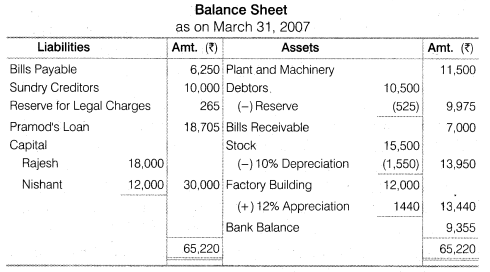

12. Following is the Balance Sheet of Jain, Gupta and Malik as on March 31, 2002.
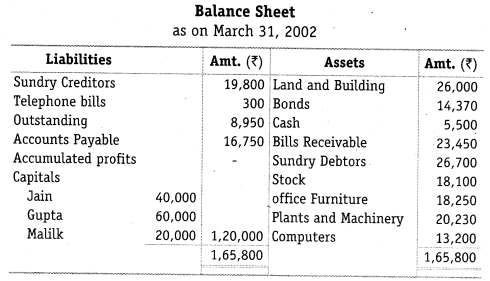
The partners have been sharing profits in the ratio of 5:3:2. Malik decides to
retire from business on April 1, 2002 and his share in the business is to be
calculated as per the following terms of revaluation of assets and liabilities :
Stock, Rs.20,000; Office furniture, Rs.14,250; Plant and Machinery Rs.23,530;
Land and Building Rs.20,000.
A provision of Rs.1,700 to be created for doubtful debts. The goodwill of the firm
is valued at Rs.9,000.
The continuing partners agreed to pay Rs.16,500 as cash on retirement of
Malik, to be contributed by continuing partners in the ratio of 3:2. The balance
in the capital account of Malik will be treated as loan.
Prepare Revaluation account, capital accounts, and Balance Sheet of the
reconstituted firm.
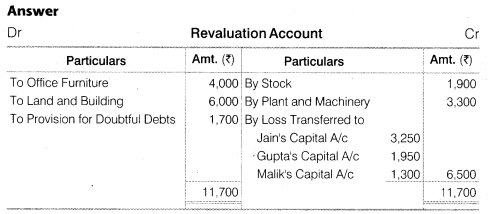
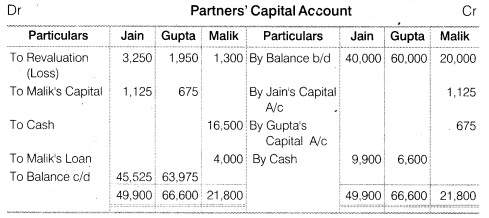
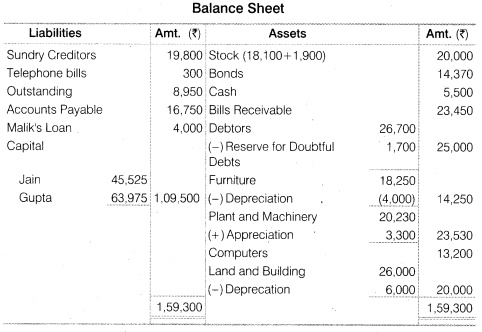
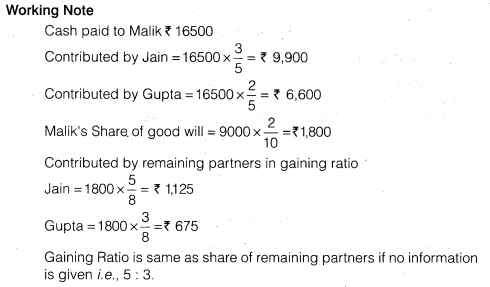
13. Arti, Bharti and Seema are partners sharing profits in the proportion of 3:2:1
and their Balance Sheet as on March 31, 2003 stood as follows :
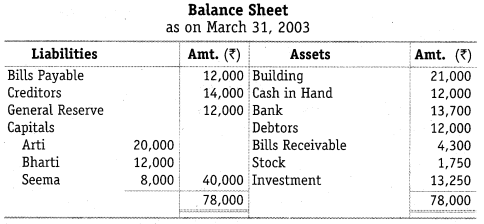
Bharti died on June 12, 2003 and according to the deed of the said partnership,
her executors are entitled to be paid as under :
(a) The capital to her credit at the time of her death and interest thereon @
10% per annum.
(b) Her proportionate share of reserve fund.
(c) Her share of profits for the intervening period will be based on the sales
during that period, which were calculated as Rs.1,00,000. The rate of profit
during past three years had been 10% on sales.
(d) Goodwill according to her share of profit to be calculated by taking twice
the amount of the average profit of the last three years less 20%. The profits
of the previous years were :
2001 – Rs.8,200
2002 – Rs.9,000
2003 – Rs.9,800
The investments were sold for Rs.16,200 and her executors were paid out. Pass
the necessary journal entries and write the account of the executors of Bharti.
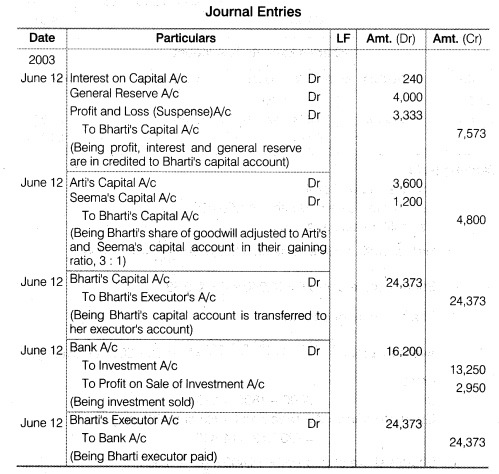
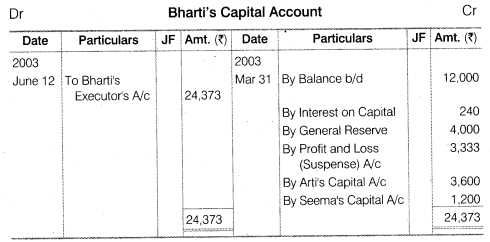

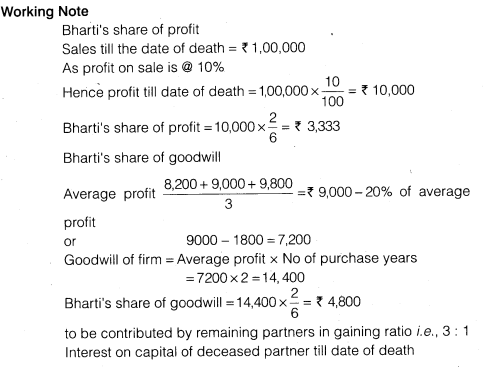

14. Nithya, Sathya and Mithya were partners sharing profits and losses in the
ratio of 5:3:2. Their Balance Sheet as on December 31, 2002 was as follows :
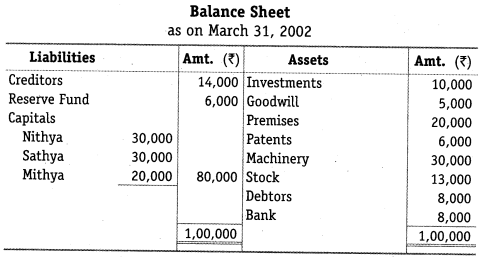
Mithya dies on May 1, 2002. The agreement between the executors of Mithya
and the partners stated that :
(a) Goodwill of the firm be valued at 2.1/2 times the average profits of last four
years. The profits of four years were : in 1998, Rs.13,000; in 1999, Rs.12,000; in 2000, Rs.16,000; and in 2001, Rs.15,000.
(b) The patents are to be valued at Rs.8,000, Machinery at Rs.25,000 and
Premises at Rs.25,000.
(c) The share of profit of Mithya should be calculated on the basis of the profit
of 2002.
(d) Rs.4,200 should be paid immediately and the balance should be paid in 4
equal half-yearly instalments carrying interest @ 10%.
Record the necessary journal entries to give effect to the above and write the
executor’s account till the amount is fully paid. Also prepare the Balance Sheet
of Nithya and Sathya as it would appear on May 1, 2002 after giving effect to
the adjustments
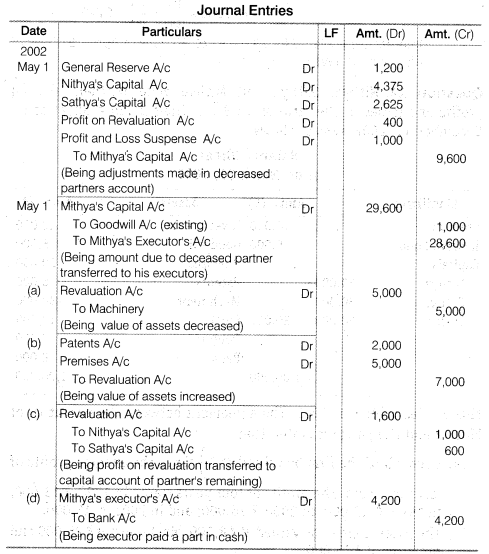
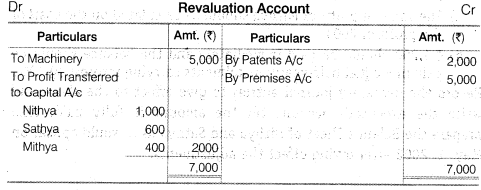
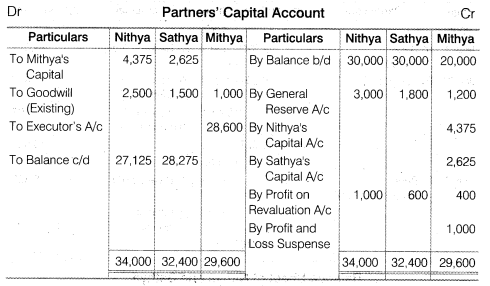
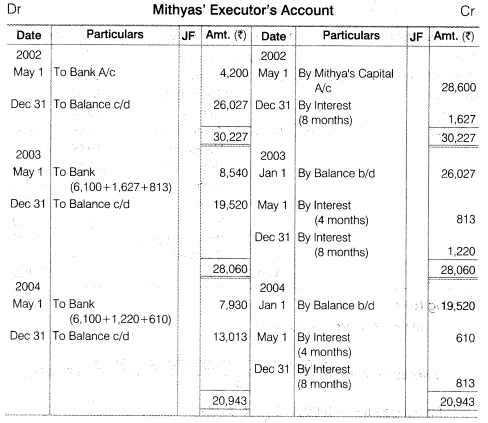
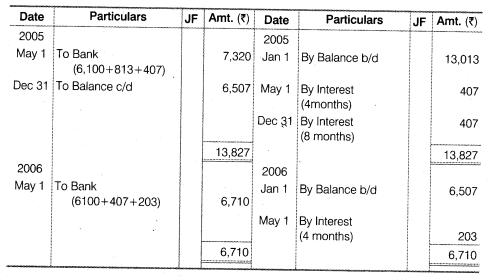
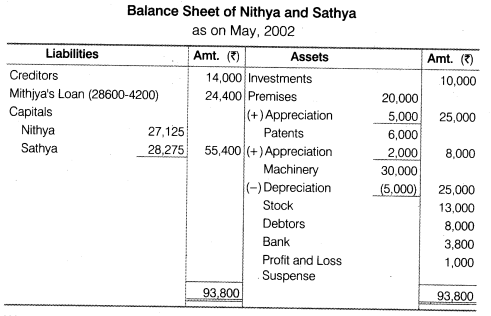
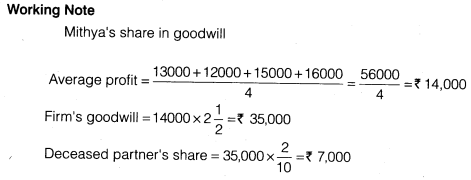
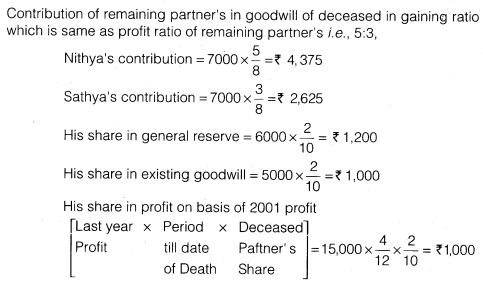
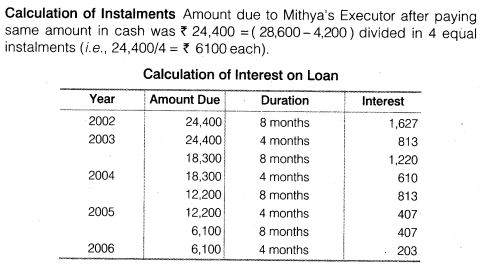
More Resources for CBSE Class 12
RD Sharma class 12 Solutions
NCERT Solutions for Class 12th English Flamingo
NCERT Solutions for Class 12th English Vistas
CBSE Class 12 Accountancy
NCERT Solutions for Class 12th Maths
CBSE Class 12 Biology
CBSE Class 12 Physics
CBSE Class 12 Chemistry
CBSE Sample Papers For Class 12
NCERT Solutions Accountancy Business Studies Macro Economics Commerce